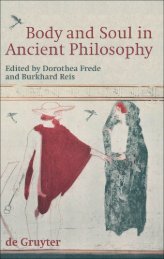[Niall_Livingstone]_A_Commentary_on_Isocrates'_Busiris
[Niall_Livingstone]_A_Commentary_on_Isocrates'_Busiris
[Niall_Livingstone]_A_Commentary_on_Isocrates'_Busiris
You also want an ePaper? Increase the reach of your titles
YUMPU automatically turns print PDFs into web optimized ePapers that Google loves.
2. INTRODUCTIONspeech-within-the-speech which follows, he praises <strong>Busiris</strong> by divertingattenti<strong>on</strong> from the traditi<strong>on</strong>al story to the country of which <strong>Busiris</strong>is supposed to have been king: he makes <strong>Busiris</strong> founder of theEgyptian civilisati<strong>on</strong>, which he depicts as a 'model c<strong>on</strong>stituti<strong>on</strong>' inthe manner of c<strong>on</strong>temporary Greek political theory. C<strong>on</strong>cluding thework, Isocrates <strong>on</strong>ce again addresses Polycrates directly, and takes anew, rather Plat<strong>on</strong>ic tack, warning him against poetic myths whichblasphemously present the gods' own children (such as <strong>Busiris</strong>) asvillains, and urging him to embrace the serious, morally beneficialrhetoric of which Isocrates himself is the master.The present work is, to the best of the author's knowledge, thefirst scholarly commentary <strong>on</strong> <strong>Busiris</strong> in any language. The introducti<strong>on</strong>deals with the structure, unity and generic properties of thework, and provides background informati<strong>on</strong> which will aid understanding:<strong>on</strong> the career of the addressee Polycrates; <strong>on</strong> the earlierliterary and ic<strong>on</strong>ographic traditi<strong>on</strong> for the myth of <strong>Busiris</strong>; <strong>on</strong> theGreek fascinati<strong>on</strong> with Egypt which underpins <strong>Isocrates'</strong> sketch ofher civilisati<strong>on</strong>; and <strong>on</strong> relati<strong>on</strong>ships between <strong>Busiris</strong> and the workof other c<strong>on</strong>temporary educators such as Plato. In particular, it isargued (IV.i) that <strong>Isocrates'</strong> sketch of Egyptian society is a directparody of the state c<strong>on</strong>structed in Plato's Republic, and his criticismand 'betterment' of Polycrates' speech is shown to display close textualand c<strong>on</strong>ceptual parallels with Socrates' treatment of Lysias'speech in the Phaedrus (IV.ii): parallels which may point to a widespreadtechnique in sophistic teaching. The commentary itself aimsto elucidate the text at the levels of language, style, argument andrhetorical technique (the few significant textual variants are also discussed,but since the traditi<strong>on</strong> is basically secure no new examinati<strong>on</strong>of manuscripts has been attempted). It seeks to show that thethemes and arguments of the work cohere as a unified persuasivestrategy, which presents Isocratean educati<strong>on</strong> as a practical and h<strong>on</strong>ourableopti<strong>on</strong> for the Athenian (and pan-Hellenic) elite, a middleway between the unworldly pursuit of abstract truth and amoralsophistic individualism.The <strong>Busiris</strong> is a key text in defining <strong>Isocrates'</strong> public role as writerand educator; it is also of great interest for students of the c<strong>on</strong>textand recepti<strong>on</strong> of the work of Plato; of the sophistic milieu and ofthe wider intellectual culture of classical Athens; and of the historyof literary criticism. At the same time, its modest length, its varied


![[Niall_Livingstone]_A_Commentary_on_Isocrates'_Busiris](https://img.yumpu.com/51449110/15/500x640/niall-livingstone-a-commentary-on-isocrates-busiris.jpg)




![[Richard_Sorabji]_Self__Ancient_and_Modern_Insigh(BookFi.org)](https://img.yumpu.com/30857691/1/174x260/richard-sorabji-self-ancient-and-modern-insighbookfiorg.jpg?quality=85)





